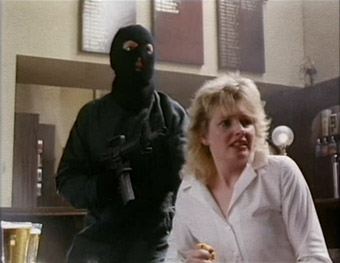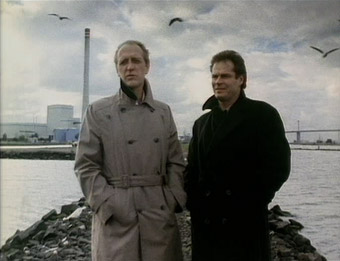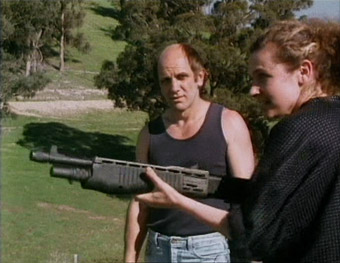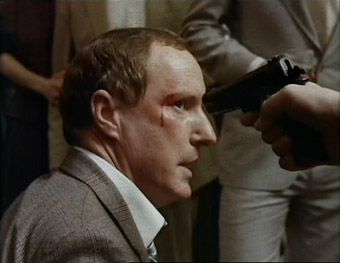|
What
is it about some crime stories that makes it so easy for
an audience to identify with the criminals? Robbery or caper
tales have a particular appeal, with the notion of a group
of rule-breaking outsiders sticking it to The Man harking back to a distorted
and romantic view of the outlaws of the Old West, non-conformists
who got rich quick through a combination of ingenuity and
daring. The very idea excites the rebel within, that part
of us that wants to kick against the establishment but is
kept in check by an overriding need to be a functioning
part of it. Never mind if it was your money they hauled
off in the raid or your mother they frightened out of her knickers as
they did so, in crime movies banks are seen as a legitimate
target for robbery and an increasingly complex challenge
for the criminal mastermind. After all, how many bank robbery
tales have told their story from the point of view of the
bank, unless one of the staff is in on the deal? It's hardly
surprising when you think about it. There's a guilty pleasure
in seeing the institutions you are mortgage-enslaved to
for much if not all of your working life getting stiffed by a handful of desperados.
Take that, banks!
No
matter what the target, the more daring the robbery and the
bigger the haul, the more it captures the public imagination.
So large is the fame of the 1963 Great Train Robbery in
Britain that when Michael Crichton's identically name film was imported back in 1979, a full 26 years after the event,
it had to be renamed The First Great Train Robbery to avoid any confusion with the considerably more notorious
real-life case. Every country probably has a crime of equal notoriety, and Australia's prime candidate took place on 21st April 1976 and
the Victoria Club in Melbourne, the venue of choice for
bookies to meet and settle accounts after big race meetings.
The actual amount stolen remains unconfirmed to this day,
but estimates vary between three and twelve million dollars. The
entire robbery took just eleven minutes to complete, with not
a single shot fired and only a single guard injured. It quickly
became known as The Great Bookie Robbery.

The
nature of the relationship between the police and the Melbourne
criminal fraternity of the time meant that the authorities
had a damned good idea who was behind the raid, but just
didn't have the evidence to back up their theories. One
of the gang, Norman Lee, was arrested and charged, but was
later acquitted, and the full facts of the case might never
have been established beyond rumour had Lee not been shot
and killed by police during an attempted raid at Melbourne
Airport in 1992. As part of the subsequent inquest, Lee's
lawyer, Phillip Dunn QC, revealed the full details of the
Victoria Club raid, including the identities of the participants,
all of whom had by then been killed. But with no-one successfully
convicted of the crime and the money never recovered, the technicalities of law state that it
remains officially unsolved.
In
1986 the robbery became the subject of an Australian TV
miniseries, directed by Marcus Cole and Mark Joffe from
a script by journalist Philip Cornford (with extensive uncredited
re-writes by producer Ian Bradley and co-director Cole).
Working ten years after the event from the documented facts
and their own research, the filmmakers were still ten years
ahead of Phillip Dunn's all-revealing statement, but apparently
did gain access to Norman Lee, who doubtless had some input
on the fine detail and even arranged for them to film at
his house, the actual location where much of the planning
for the robbery took place.
What
Lee apparently chose to keep to himself was the most extraordinary
aspect of the robbery, that the cash didn't actually leave
the building from which it was stolen until some weeks later.
The gang had rented an office two floors above the Victoria
Club and simply transferred the money there, then made a
deliberately noisy getaway to convince all and sundry that
the spoils had been transported to a faraway location. The
reason this is not in the film is simply that no one involved knew
this to be the case until Phillip Dunn's revalations
ten years later. (A
similarly bold stunt was pulled by South African bank robber,
Andre Stander and his gang, who knowingly robbed a bank located below
the offices of the task force that had been assembled to catch them.)

Names
may have been changed here to protect the not-so-innocent,
but in every other respect The Great Bookie Robbery
is remarkably true to the known facts, with only a few flourishes
added for dramatic licence (one of which is openly admitted
to on the commentary tracks). Mind you, embellishment really
isn't needed here, so audacious are some elements of this
particular caper. Take the initial planning. Gang leader
Mike Power is coming to the end of a stretch in Parkhurst
prison on the Isle of White when his cell mate shares his
plan for the robbery in exchange for a share of the loot. At
this time, the British authorities operated a scheme known
as Terminal Leave, which allowed prisoners who were approaching
the end of their sentence a week's leave to acclimatise
themselves with their home and family in preparation for
their release. Taking advantage of this, Power is met at
the prison gates by his girlfriend Carol and young son David,
then secretly flies to Melbourne, meets up with his old
comrades, outlines the job, takes part in an armed robbery
to set himself up with some funding, and shoots back to the
UK. When the police drop round to follow up a report that
he's been spotted halfway round the world, he ambles sleepily
out of his bedroom and wonders what the fuss is about.
Some
characters inevitably play to genre conventions, particularly
the gang's inevitable weak link (the overly nervous Jaffa)
and potentially incendiary crazy (the sullen, mad-eyed Cracka
Park). But there's some neat red herring work going on here,
with their potentially negative attributes playing up just
before the robbery only to be held in check during the job
itself. Cracka in particular is nicely developed against
type, the early suggestion that he and Mike have a troubled
history dissolving to reveal a man of dogged loyalty and
even occasional sensitivity, turning up unexpectedly on
Carol's doorstep like a wilderness ghost to help fund her
husband's bail money and later entering into a committed
relationship with Carol's pretty and danger-hungry sister
Annie.
The
film aligns us with Mike and the gang from its opening scene
and its allegiance never wavers. The police are represented
only intermittently by the cheerless Detective Edwards and
he's in cahoots with the Temple brothers, two unpleasant
representatives the nastier side of the Melbourne underworld.
The nearest the investigating team come to upsetting the
gang's plans is Chicka White, an undercover cop who latches
onto Jaffa but whose threat potential is repeatedly delayed
because Mike never swallows Jaffa's suggestion that he's
someone worth trusting.
The
traditional generic pleasures of the planning and execution
of the robbery are extended here by the gang's need to carry
out smaller jobs to fund the big one, and the crew interplay
and character detail is given the sort of screen time that
feature film length dramas rarely allow. The performances
are crucial to why this works so well, with just about every part well cast and convincingly played, John Bach's
icy cool as Power and Bruno Lawrence's brooding menace as
Cracka Park being the obvious standouts. Considerable kudos are
also due to Andy Anderson, Scott Burgess and Gary Day as
fellow crew members Tony Loft, Robbo Robbins and Colin Reynolds
respectively, while Catherine Wilkin strikes just the right
note of patient weariness as Carol, the flipside of her
thrill-seeking sister Annie, whose still-naïve enthusiasm
for the criminal life is nicely caught by Madeleine Blackwell.
And yes, Australian soap fans, that's Paul Sonkkila of Sons
and Daughters and Ray Meagher of Home and
Away as underworld heavies Bob and Merv Temple.

There's
none of the mouthy mockney posturing that has blighted British
crime drama in recent years, but an impressively understated
approach to character and incident that is both compelling
and believable. The Great Bookie Robbery
is an old-fashioned heist drama in the best sense of the
term, free of the MTV-inspired visual trickery, tinted visuals
and post-modernist referencing that seem almost de rigueur
in its modern TV and film equivalents. Cole and Joffe's
taut, economical direction, Ellery Ryan's purposeful camerawork
and Kerry Regan's scalpel-sharp editing put it up there
with the best British TV crime dramas of the period, while
the no-nonsense efficiency and excitement of the action
sequences rival those of a fair few big screen thrillers.
Like the work of the gang, this is a thoroughly professional
job. The old maxim proves true – they really don't make
'em like this any more.
The
Great Bookie Robbery was designed from the start
to emulate the style of British TV crime series
of the 70s and early 80s and if you're familiar with the
touchstones (The Sweeny, Minder,
etc.) then the look of the series will be instantly recognisable.
Shot entirely on 16mm and largely on location (including
many of the actual locations in which the robbery and planning
took place), the 4:3 image lacks the pristine sheen of 35mm
and high-def, but has that particular grittiness unique
to this format, and neither I nor the filmmakers would have
it any other way. Grain is obviously going to be evident,
but the transfer is otherwise very good, with the contrast
and black levels generally solid and colours largely true
to life, a little muted in places but bright enough when
they need to be. The sharpness and detail are as good as
you'd hope for and frequently a lot better.
The
Dolby 2.0 mono soundtrack inevitably lacks the dynamic range
and spread of more recent TV dramas, but is clear and free
of noise and hiss. One thing that did strike me is how loud
it was for Dolby 2.0, prompting me to crank my amp volume
way down to avoid an eardrum split.
Originally
broadcast as a series of six programmes running for one
hour apiece (including commercial breaks), the series here
has been compiled into three episodes of just shy of 90
minutes each. Despite an overall running time of 263 minutes,
each of the episodes features a screen-specific
filmmakers' commentary.
The
first is delivered by Mark Joffe, who helmed the first two
shows that comprise episode 1. He provides much of the technical
info I was curious about, including how the series was originally
broadcast, the shooting format and the budget – a then high
3.8 million dollars – but also plenty of information on
the cast, the location, the shoot, and the true-life background
of some of the characters. The subject of working with an
ensemble cast throws up some interesting stories, not least
the job of preventing actors with time on their hands from
trying to upstage each other. Despite some dead spots I
learned quite a bit here, and the background trivia is sometime
amusing, from the post-production change of "wanker"
to "whacker" to avoid censorship problems, to
a screening of the first two shows at the Victoria Club
itself for an audience of bookies, who though it "a
hoot."

The
second episode (comprised of parts 3 and 4) was directed
by Marcus Cole, and it's he who moves into the commentary
chair, along with actor Andy Anderson, who plays Tony Loft
in the series. With the two able to bounce off one another,
this is a slightly livelier affair than the first and equally
informative. Both men share memories and anecdotes from
the shoot and their knowledge of (and in one amusing case,
encounter with) the Melbourne underworld, and Cole is not
shy about revealing a continuity error caused by his having
to steal a couple of shots from Joffe's episodes. Pleasingly
and most surprisingly, there's almost no overlap with the
first commentary.
As
part 5 was directed by Joffe and part 6 by Cole, the commentary
for episode 3 is handled by both. Clearly still good friends,
the two take an entertainingly light-hearted but still revealing
approach to their work, adding further to the background
information on the making of the series and the real-life
criminals the characters are based on. There's some particularly
good stuff here, including a guarded dismay at the direction
TV drama has taken – they note, for example, that recent
crime shows all seem to have a blue tint (a bit of stylistic
nonsense I have also been known to gripe about), that modern
series are more the result of committee meetings than filmmaker
inspiration, and that the only station currently making genuinely
cinematic drama seems to be HBO. They are joined in the
last third by actor Andy Anderson, which makes this the busiest
commentary of the lot. One thing that is very pronounced
here, though, is that the commentary goes gradually but
markedly out of sync with the picture, increasing to a disorientating
32 seconds at worst. The arrival of Andy Anderson seems
to reset the time shift but it happens again, and by the
end credits the commentary is 13 seconds ahead of the picture.
A
must for fans of well told heist stories, The Great
Bookie Robbery should have a special appeal for
those left unmoved by the mechanical mood, by-the-numbers
casting and look-at-me filmmaking of more recent efforts,
and should teach most viewers something about a crime whose
fame on its home turf does not seem to have spread to our
shores. It's a hugely enjoyable and involving series, and
one of those works that creates and retains a dramatic tension
even if you are familiar with the real case. Eureka's DVD
release sports a decent transfer, and although it only has
one extra, it's so loaded with information about the case
and the production that you are in no way left wanting.
Recommended.
|